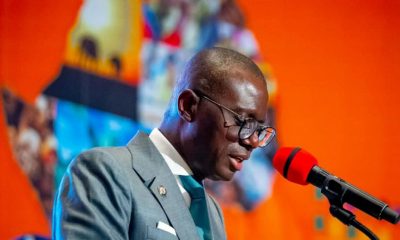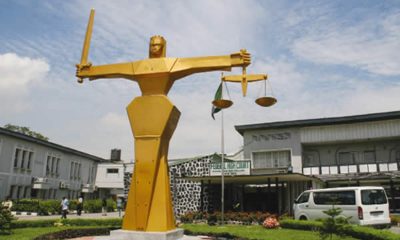Business
Why we introduced N100bn IBTC infrastructure fund — CEO

Dr Demola Sogunle, Chief Executive Officer of Stanbic IBTC Holding Plc, has said that the bank established a N100 billion fund to help close the infrastructure gap in Nigeria.
Sogunle said this at a Hybrid event organised by the Rotary Club of Ikeja, District 9110 with the topic, “Solving Infrastructure Deficit in Nigeria”, on Monday in Lagos.
According to him, infrastructure deficit truly exists in Nigeria and begs for immediate solution.
“So, in order for us not to complain, we saw the situation and decided to create value by introducing IBTC Infrastructure fund of N100 billion, and the important thing is that we have started disbursing already.
“The plan is simple: we would provide project owners with long-term capital to fund their projects whilst investors enjoy competitive returns as well as achieve set investment goals
“The Fund would be released in tranches, starting with the first N20 billion tranche which is now open for subscription, providing an avenue for investors to gain exposure to critical infrastructure projects.
READ ALSO:
- Don’t succumb to pressure to release Nnamdi Kanu, Northern Coalition warns Buhari
- Baba Suwe, ace comic actor, is dead (Video)
- Imo community pass night in bush as gunmen kill soldiers
“The tranche has a 12-year maximum duration,’’ he said.
Sogunle also said Nigeria, ranking 7th in terms of population, needed 1.5 trillion dollars over the period of 10 years to close infrastructure gap, which is a lot of money.
He said that the budget that was put to infrastructure projects could not take Nigeria anywhere.
“The 4.89trillion capital expenditure, dedicated to infrastructure projects accounts for 30 per cent of the proposed 2022 budget.
“The infrastructure stock, is about 30 per cent of our GDP, our GDP is about 400 billion dollars plus; Nigeria infrastructure stock of 30 per cent of GDP remains far below the 70 per cent international benchmark and it’s not going to take us anywhere.
“This is just for us to know the enormity of the issue,’’ Sogunle said.
He noted that African countries like Egypt, Tunisia, South Africa, etc, were far ahead of Nigeria in terms of infrastructure development.
He said that in the 2019 Global Competitiveness Index Report, Nigeria scored 48.33 points out of 100 and ranked 130th of 141 countries surveyed for the overall quality infrastructure.
READ ALSO:
Sogunle mentioned some challenges affecting infrastructure development in the country.
These include, huge capital outlay versus Budget Constrains and Huge cost of financing, political and regulatory risk which is high, poor maintenance culture, low risk appetite by financial institutions and suboptimal record of past projects.
The bank CEO also said that the impact of $10bn infrastructure investment required on GDP growth rate was assumed at N3.6trillion (US$10billion) per year from 2019 to 2030 according to Nigerian Integrated Infrastructure Master plan (NIIMP).
He said that the real GDP was expected to decline by 0.19 per cent in 2020 but rebound to 3.85 per cent by 2021 and 10.68 per cent by 2030, reflecting the impact of the implementation of the plan.
He stressed that if 10 per cent of the proposed 10 billion dollars, ($1bn) is invested, this would still bode well for the economy and positively impact the GDP growth given the current level of infrastructure deficit.
Sogunle advocated a positive public-private sector collaboration to tackle infrastructure gap in the country, recommending unconventional financing methods e.g. Road infrastructure tax credit scheme, infrastructure funds etc .
He said there was the need for implementation of investment-friendly laws, Public-Private Partnership (PPP), procurement (Due process for bids).
He also suggested increased participation of private investors in infrastructure investments and consistent sector policies.
(NAN)
Business
Imo Economic Summit: Aliko Dangote Vows to Become State’s Largest Investor

Imo Economic Summit: Aliko Dangote Vows to Become State’s Largest Investor
OWERRI — Africa’s richest man, Aliko Dangote, has assured Imo State Governor Hope Uzodimma that the Dangote Group is prepared to become one of the biggest investors in Imo State, reaffirming the conglomerate’s commitment to expanding its footprint in Nigeria.
Speaking on Thursday during the opening session of the Imo Economic Summit 2025, Dangote called on the state government to specify key sectors requiring investment, promising immediate action once directives are given.
Dangote, who described Governor Uzodimma as a long-time friend, commended him for fostering an enabling environment for business and economic growth in the state.
READ ALSO:
- NSCDC rejects VIP protection requests from senators as demand surges after police withdrawal
- Edo Assembly Moves to Arrest Obaseki, Others Over MOWAA, Radisson Hotel Probe
- Three Top Contenders to Replace William Troost-Ekong as Super Eagles Captain
“We will be one of your biggest investors in Imo. So please tell me the area to invest and we will invest,” he said.
The African industrialist also encouraged Nigerian entrepreneurs to focus on developing their home regions, stressing that sustainable economic growth cannot depend on foreign capital alone.
“What attracts foreign investors is a domestic investor. Africa has about 30 percent of the world’s minerals. We are blessed,” he noted.
Dangote further highlighted progress at the Dangote Refinery, announcing that the facility is on track to achieve a 1.4 million barrels-per-day production capacity, making it the largest single-train refinery in the world.
The assurance marks a significant boost for Imo State’s investment outlook as the government continues efforts to strengthen its economy and attract large-scale private sector participation.
Imo Economic Summit: Aliko Dangote Vows to Become State’s Largest Investor
Auto
Court of Appeal Affirms Ruling Barring VIO from Seizing Vehicles or Fining Motorists
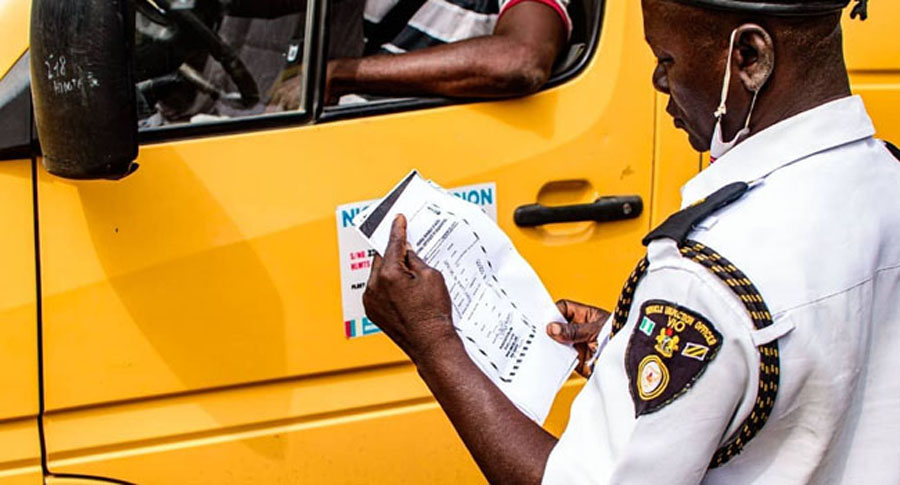
Court of Appeal Affirms Ruling Barring VIO from Seizing Vehicles or Fining Motorists
The Court of Appeal, Abuja, on Thursday, upheld a previous Federal High Court judgment prohibiting the Vehicle Inspection Officers (VIO) and the Directorate of Road Traffic Services (DRTS) from confiscating vehicles or imposing fines on motorists without lawful authority.
A three-member panel of appellate justices, led by Justice Oyejoju Oyewumi, dismissed the appeal filed by the VIO, describing it as lacking merit and affirming the October 16, 2024 ruling of the high court.
The original suit, marked FHC/ABJ/CS/1695/2023, was filed by public interest lawyer Abubakar Marshal, who alleged that he was unlawfully stopped and had his vehicle confiscated by VIO officials at Jabi District, Abuja, on December 12, 2023. He contended that the action was a violation of his fundamental rights.
READ ALSO:
- FG secures release of three Nigerians detained in Saudi Arabia
- Groups Reject Senator’s Call for Removal of NSA Nuhu Ribadu
- US authorities arrest Nigerian CEO Cashmir Chinedu Luke for alleged $7m VA fraud
Justice Nkeonye Maha of the Federal High Court had declared that no law empowers the VIO to stop, seize, impound, or fine motorists, and granted a perpetual injunction restraining the agency and its agents from further violating citizens’ freedom of movement, presumption of innocence, and right to own property.
The court held that only a court of competent jurisdiction can impose fines or sanctions on motorists. It further ruled that the actions of the Respondents violated Section 42 of the 1999 Constitution and relevant articles of the African Charter on Human and Peoples’ Rights.
Although the applicant had sought N500 million in damages and a public apology, the court awarded him N2.5 million. Respondents included the Director of the Directorate of Road Traffic Services, the Abuja Area Commander, the team leader, and the Minister of the Federal Capital Territory.
The appellate court’s decision confirms that the VIO and DRTS cannot legally harass motorists, reinforcing citizens’ constitutional rights on the road.
Court of Appeal Affirms Ruling Barring VIO from Seizing Vehicles or Fining Motorists
Business
BREAKING: CBN Removes Cash Deposit Limits, Raises Weekly Withdrawal

BREAKING: CBN Removes Cash Deposit Limits, Raises Weekly Withdrawal
The Central Bank of Nigeria (CBN) has announced sweeping changes to its cash-handling regulations, removing all limits on cash deposits and increasing the weekly cash withdrawal limit across all channels to N500,000, up from N100,000.
The changes were detailed in a circular titled “Revised Cash-Related Policies,” issued to all banks and signed by Dr. Rita Sike, Director of the Financial Policy & Regulation Department.
According to the apex bank, the revised framework is part of ongoing efforts to reduce the rising cost of cash management, strengthen security, and address money laundering concerns linked to Nigeria’s heavy dependence on cash transactions. The CBN noted that previous cash-related policies were introduced to discourage excessive cash usage and promote electronic payment systems, but evolving realities necessitated an update.
Effective January 1, 2026, several major adjustments will take effect. The cash deposit limit has been completely removed, and charges on excess deposits have been scrapped. Weekly withdrawal limits have also been increased to N500,000 for individuals and N5 million for corporate entities, with withdrawals beyond these levels attracting prescribed excess charges.
READ ALSO:
- U.S imposes visa restrictions on Nigerians over mass killings, alleged violence against Christians
- NDIC Warns Nigerians Against Ponzi Schemes, Urges Savings Only in CBN-Licensed Banks
- Nigeria Urged to Prioritize Citizenship, Social Harmony Amid Rising Conflict, Insecurity
The special monthly authorisation, which previously allowed individuals to withdraw N5 million and corporates N10 million once a month, has been discontinued.
For ATM withdrawals, the daily limit remains N100,000 per customer, with a maximum of N500,000 weekly, forming part of the overall withdrawal limit applicable to all channels, including POS transactions.
Excess withdrawals above approved thresholds will attract fees of 3% for individuals and 5% for corporate customers, shared between the CBN and the operating bank in a 40:60 ratio.
Banks have also been instructed to load all currency denominations in ATMs. The cap on over-the-counter encashment of third-party cheques remains fixed at N100,000, and such payments will count toward the cumulative weekly withdrawal limit.
Furthermore, financial institutions are required to submit monthly compliance reports to supervisory departments, including the Banking Supervision Department, Other Financial Institutions Supervision Department, and Payments System Supervision Department.
The circular clarified that revenue-generating accounts of federal, state, and local governments, as well as accounts held by microfinance and primary mortgage banks, are exempt from the new rules. However, long-standing exemptions previously granted to embassies, diplomatic missions, and aid-donor agencies have now been removed.
BREAKING; CBN Removes Cash Deposit Limits, Raises Weekly Withdrawal
-
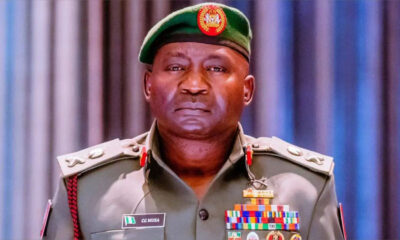
 News3 days ago
News3 days agoDefence Minister Unveils New Security Strategy, Orders Troops to Shoot Armed Bandits on Sight
-

 metro3 days ago
metro3 days agoTeam Justice accuses authorities of attempting to exclude Mohbad’s father from DNA test process
-
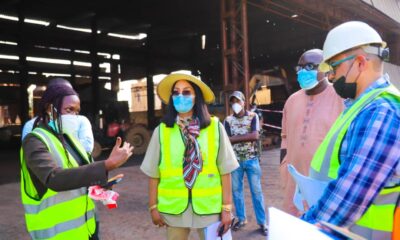
 metro2 days ago
metro2 days agoSenate Launches Emergency Probe into Widespread Lead Poisoning in Ogijo, Lagos/Ogun
-

 International3 days ago
International3 days agoMeta to Block Under-16s from Instagram, Facebook, Threads ahead of Australia’s World-First Youth Social Media Ban
-

 metro3 days ago
metro3 days agoShocking confession: Boyfriend admits luring FRSC officer, child to death in Osun ritual murder
-

 Sports3 days ago
Sports3 days agoLeeds United Stun Chelsea 3-1 at Elland Road to Climb Out of Relegation Zone
-

 News2 days ago
News2 days agoBREAKING: Tinubu Sends Fresh Ambassadorial Nominations to Senate, Names Ibas, Ita Enang, Dambazau
-

 News3 days ago
News3 days agoEmber-months safety: Carloha, FRSC intensify campaign against distracted driving





